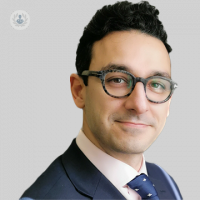When is knee replacement surgery considered?
Written by:Knee replacement surgery is the latest topic of discussion in this article below, as well-regarded and highly skilled consultant knee surgeon, Mr Arman Memarzadeh, shares valuable insights with regards to when knee surgery is considered, as well as outlining the main differences between partial and total knee replacements.

When is knee replacement surgery considered?
If you have severe or constant knee pain, knee replacement surgery may be your last option. Your knee pain may be so bad that you can’t walk far, you can’t sleep well, and you can’t rest comfortably. If this is your situation, your doctor may suggest you see an orthopaedic knee surgeon.
The surgeon will check if you need knee replacement surgery and what kind of surgery is best for you. There are two main types of knee replacement surgery: partial and total.
Both are big operations, and you will need crutches for at least six weeks. Your new knee will feel different from your natural knee you will need to use crutches for at least six weeks. Your new artificial knee will feel different to your natural knee and may not achieve a full range of movement.
What is a partial knee replacement, and how does it differ from a total knee replacement?
This means replacing only one part of the knee, usually the medial part. This is the most common place where knee arthritis occurs. The surgeon will not touch any of your knee ligaments, so you will recover faster than with a total knee replacement.
You may be able to stop using crutches in six weeks. Your artificial knee may feel more natural because you keep more of your own tissue and your ligaments are not cut. Partial knee replacement surgery is not as risky as total knee replacement surgery, but it is not for everyone.
What are knee implants, and when and how are they implanted?
Knee implants are metal and plastic parts. In a total knee replacement, the surgeon puts metal on the femur and tibia; usually cobalt chrome for the femur and titanium for the tibia. A plastic piece (polyethylene cross-linked with gamma radiation to make it very strong) connects the metal parts, acting as the joint surface.
When is a revision of a knee replacement required?
On average, three per cent of knee replacements need revision after 10 years and six to seven per cent after 15 years. How long your knee replacement lasts depends on how much you use your knee.
What is the main goal of knee replacement surgery?
The goal of knee replacement surgery is to reduce knee pain and improve function.
What is recovery time like after a knee replacement, and what are the main associated risks?
You will also need a lot of physiotherapy, muscle training, and recovery after the surgery. The main risks include infection, slow healing, and tissue damage. Some specific risks of knee replacement surgery are numbness around your scar and trouble kneeling on your scar. You may also get fractures around the implants, which may require another surgery.
A common risk of total knee replacement surgery is that your knee makes clicking and clunking sounds — this happens in about 20 per cent of cases. Your knee replacement may also feel strange or stiff, which will need more recovery to move it fully.
To book an appointment with Mr Arman Memarzadeh today, simply visit his Top Doctors profile.


